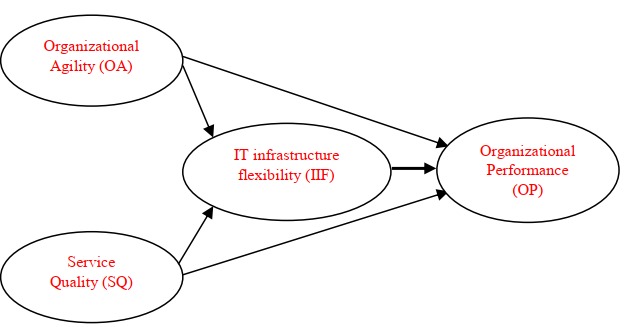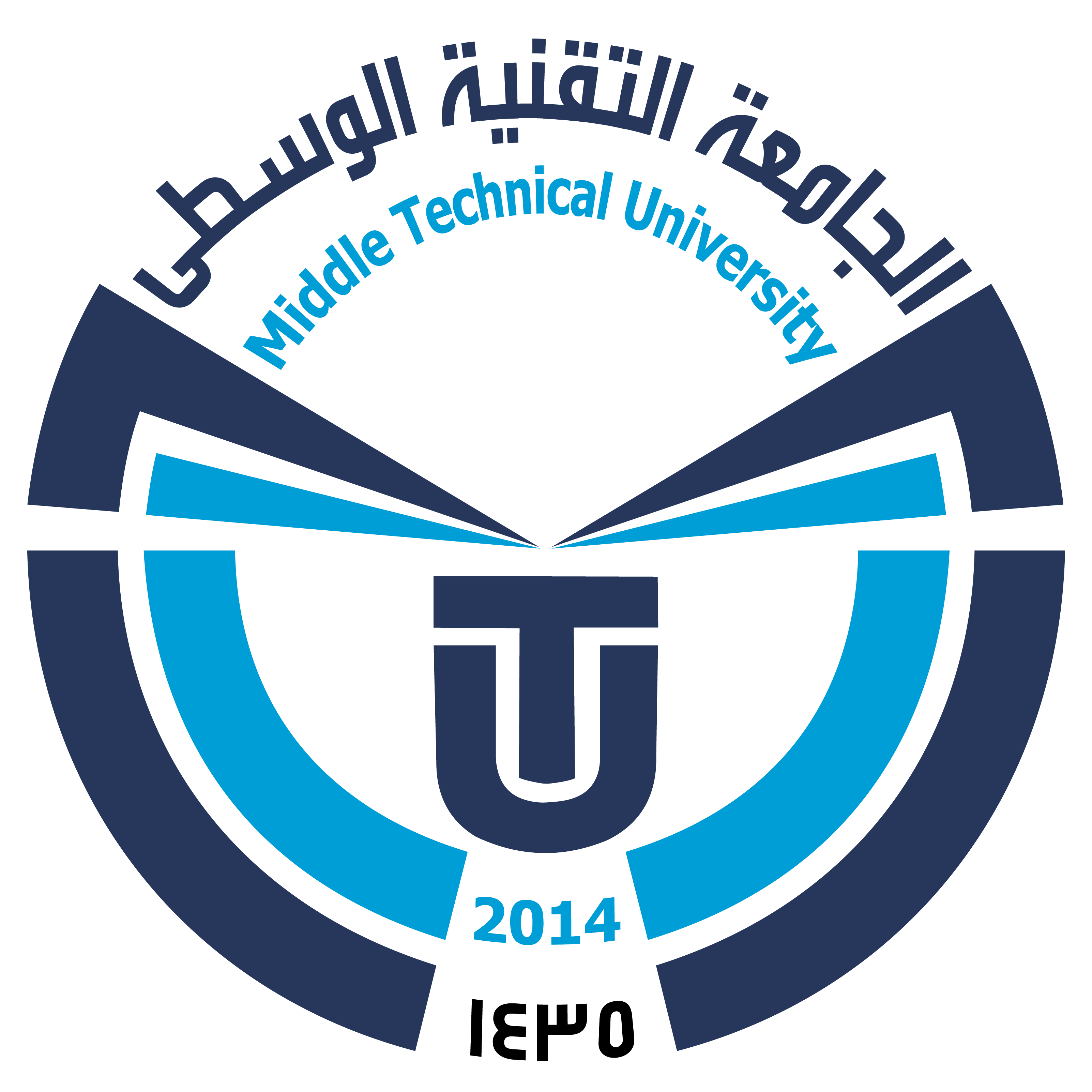Effect of Organization Agility and Service Quality on Organization Performance Through IT Infrastructure Flexibility
DOI:
https://doi.org/10.51173/tjms.v1i1.2Keywords:
Organization Agility, Service Quality, Organization Performance, IT Infrastructure FlexibilityAbstract
In this study, the effects of organization speed, service quality, and the flexibility of IT infrastructure on the success of a group of public and private universities and colleges in Diyala city were studied. The current study has a practical goal and is a detailed poll when it comes to gathering data. A questionnaire was used to get the information. It was put together by looking at books and doing research in the area. The statistical group that was looked at was made up of 384 workers and clients of Diyala University in Iraq. Using Cochran’s sample size method, 384 people were chosen as a statistical sample. The method for picking people was random stratification. In this study, organization speed and service quality were looked at as independent factors, organization success as a dependent variable, and IT infrastructure flexibility as an intermediate variable. Cronbach’s alpha was used to measure the truth of both form and content and to figure out how reliable something was. When structural equation modelling was used in the Lisrel software system, the results showed that the speed and service quality of the organization has a good effect on the success of the organization, with the flexibility of the IT infrastructure playing a mediating role.
References
Baškarada, S., and Koronios, A.,“The 5S organizational agility framework: A dynamic capabilities perspective”, Int. J. Organ. Anal, vol. 26, no. 2, pp. 331–342, 2018, https://doi.org/10.1108/IJOA-05-2017-1163
Mokhaled Fouad Shujaa, Aminaa Abdelah Halboos, Rami Abbas Hameed “The Shift Towards Balancing Programs and Performance and its Role in Improving Government Performance in Iraq”, Journal of Techniques, 2708-8383, Vol. 5, No. 2, 2023, Pages 265-271, Pages 265-27, https://doi.org/10.51173/jt.v5i2.1234
Chung, T.T., Liang, T.-P., Peng, C.-H.; Chen, D.-N., and Sharma, P., “Knowledge Creation and Organizational Performance: Moderating and Mediating Processes from an Organizational Agility Perspective”, AIS Transactions on Human-Computer Interaction, vol. 11, pp. 79 –106, 2019, https://doi.org/10.17705/1thci.00114
Liu, H.M., and Yang, H.F., “Network resource meets organizational agility: Creating an idiosyncratic competitive advantage for SMEs.” Management Decision, vol. 58, pp.58–75, 2020, http://dx.doi.org/10.1108/MD-10-2017-1061
Ganguly, A., Talukdar, A., and Chatterjee, D., “Evaluating the role of social capital, tacit knowledge sharing, knowledge quality and reciprocity in determining innovation capability of an organization”, Journal of Knowledge Management, vol.23, pp.1105–1135, 2018, https://doi.org/10.1108/JKM-03-2018-0190.
Eman Yassein Ahmed, Amer Abdel-Latif Al-Amery, Noor Bassim abd “The Relationship and Impact of Customer Relationship Management Techniques on Service Quality: An Exploratory Study in the Dora Municipality”, ”, Journal of Techniques, 2708-8383, Vol. 5, No. 1, 2023, Pages 208-215, , Pages 208-215, https://doi.org/10.51173/jt.v5i1.853.
Singh, S.K., Mazzucchelli, A., Vessal, S.R., and Solidoro, A., “Knowledge-based HRM practices and innovation performance: Role of social capital and knowledge sharing”, J. Int. Manag, vol. 27, 2021, https://doi.org/10.1016/j.intman.2021.100830
Al-Omoush, K.S., Simón-Moya, V., and Sendra-García, J., “The impact of social capital and collaborative knowledge creation on e-business proactiveness and organizational agility in responding to the COVID-19 crisis”, J. Innov. Knowl, vol. 5, pp. 279–288, 2020, https://doi.org/10.1016/j.jik.2020.10.002
Arsawan, I.W.E., Koval, V., Rajiani, I., Rustiarini, N.W., Supartha,W.G., and Suryantini, N.P.S., “Leveraging knowledge sharing and innovation culture into SMEs sustainable competitive advantage”, Int. J. Product. Perform. Manag, vol.71, pp.405–428, 2022, https://doi.org/10.1108/IJPPM-04-2020-0192
Samuel Fosso Wamba, “Impact of artificial intelligence assimilation on firm performance: The mediating effects of organizational agility and customer agility”, International Journal of Information Management, Vol. 67, 102544, ISSN 0268-4012, 2022, https://doi.org/10.1016/j.ijinfomgt.2022.102544
Dulce Gonçalves, Magnus Bergquist, Sverker Alänge, and Richard Bunk, “How Digital Tools Align with Organizational Agility and Strengthen Digital Innovation in Automotive Startups”, Procedia Computer Science, Vol. 196, pp. 107-116, ISSN 1877-0509, 2022, https://doi.org/10.1016/j.procs.2021.11.079
Mahlagha Darvishmotevali, Levent Altinay, and Mehmet Ali Köseoglu, “The link between environmental uncertainty, organizational agility, and organizational creativity in the hotel industry”, International Journal of Hospitality Management, vol. 87, 102499, ISSN 0278-4319, 2020, https://doi.org/10.1016/j.ijhm.2020.102499
Zeithaml, V., Berry, L., and Parasuraman, A., “The behavioral consequences of service quality”, J. Mark, vol. 60, pp. 31– 46, [CrossRef], 1996, https://doi.org/10.2307/1251929
Khansaa M., and Shafa,J., “The impact of work environment quality on organizational conflict management: An Exploratory Study in Balad General Hospital”, Journal of Techniques, vol. 4, no .4, 2022, https://doi.org/10.51173/jt.v4i4.555
Keisidou, E., Sarigiannidis, L., Maditinos, D.I., and Thalassinos, E., “Customer satisfaction, loyalty and financial performance: A holistic approach of the Greek banking sector”, International Journal of Bank Marketing, vol. 31, no. 4, pp. 259 –288. [CrossRef], 2013, https://doi.org/10.1108/IJBM-11-2012-0114
Saqib, L., Farooq, M.A., Zafar, A.M., “Customer perception regarding Shar¯ı‘ah compliance of Islamic banking sector of Pakistan”, J. Islam. Account. Bus. Res. vol.7, pp. 282–303, 2016, [CrossRef], http://dx.doi.org/10.1108/JIABR-08-2013-0031
Khafafa, A.J., and Shafii, Z., “Measuring the perceived service quality and customer satisfaction in Islamic bank windows in Libya based on structural equation modelling (SEM)”, Afro Eurasian Stud, vol. 2, pp. 56–71, 2013, https://doi.org/10.1108/JIMA-04-2017-0048
Priyo, J.S., Mohamad, B., and Adetunji, R.R., “An examination of the effects of service quality and customer satisfaction on customer loyalty in the hotel industry”, Int. J. Supply Chain Manag, vol. 8, pp. 653–663, 2019, https://doi.org/10.59160/ijscm.v8i1.2807
Khamis, FM, and Abd Rashid, R., “Service quality and customer’s satisfaction in Tanzania’s Islamic banks”, J. Islam. Mark, vol. 9, pp.884–900, [CrossRef], 2018, https://doi.org/10.1108/JIMA-09-2016-0068
Parasuraman, A., Zeithaml, V.A., and Berry, L.L., “A conceptual model of service quality and its implications for future research”, J. Mark. Vol. 49, pp. 41–50, [CrossRef], 1985, https://doi.org/10.2307/1251430
Parasuraman, A., Zeithaml, V.A., and Berry, L.L., “Alternative scales for measuring service quality: A comparative assessment based on psychometric and diagnostic criteria” J. Retail, vol. 70, pp. 201–230, [CrossRef], 1994, https://doi.org/10.1016/0022-4359(94)90033-7
Othman, A., and Owen, L., “The multidimensionality of Carter Model to measure customer service quality (SQ) in the Islamic banking industry: A study in Kuwait finance house”, Int. J. Islam. Financ. Serv. Vol. 3, pp. 1–12,. 2001.
Fornell, C., “A national customer satisfaction barometer: The Swedish experience”, Journal of Marketing, vol. 56, pp. 6–21. [CrossRef], 1992, https://doi.org/10.2307/1252129
Hossain, M., and Leo, S., “Customer perception on service quality in retail banking in Middle East: The case of Qatar”, Int. J. Islam. Middle East. Financ. Manag, vol. 2, pp. 338–350, [CrossRef], 2009, https://doi.org/10.1108/17538390911006386
Fauzi, AA, and Suryani, T., “Measuring the effects of service quality by using CARTER model towards customer satisfaction, trust and loyalty in Indonesian Islamic banking”, J. Islam. Mark, vol.10, pp. 269–289, [CrossRef], 2019, https://doi.org/10.1108/JIMA-04-2017-0048
Al-Tamimi, H.A.H., and Al-Amiri, A., “Analyzing service quality in the UAE Islamic banks”, J. Financ. Serv. Mark, vol. 8, pp. 119–132. [CrossRef], 2003, https://doi.org/10.1057/PALGRAVE.FSM.4770112
Terry Anthony Byrd, and Douglas E. Turner, “An exploratory examination of the relationship between flexible IT infrastructure and competitive advantage”, Information & Management, Vol.39, no. 1, pp. 41-52, ISSN 0378-7206, 2001, https://doi.org/10.1016/S0378-7206(01)00078-7
Nancy Bogucki Duncan, “Capturing Flexibility of Information Technology Infrastructure: A Study of Resource Characteristics and Their Measure”, Journal of Management Information Systems, vol. 12, no.2, pp. 37-57, Rutledge, 1995, https://doi.org/10.1080/07421222.1995.11518080
Samuel Fosso Wamba, Angappa Gunasekaran, Shahriar Akter, Steven Ji-fan Ren, Rameshwar Dubey, and Stephen J. Childe, “Big data analytics and firm performance: Effects of dynamic capabilities”, Journal of Business Research, vol. 70, pp. 356-365, ISSN 0148-2963, 2017 ,https://doi.org/10.1016/j.jbusres.2016.08.009
Manjul Gupta, and Joey F. George, “Toward the development of a big data analytics capability”, Information & Management, vol. 53, no. 8, pp. 1049-1064, ISSN 0378-7206, 2016, https://doi.org/10.1016/j.im.2016.07.004
Gupta, S., Qian, X., Bhushan, B., and Luo, Z. “Role of cloud ERP and big data on firm performance: a dynamic capability view theory perspective”, Management Decision, vol. 57, no. 8, pp. 1857-1882, 2016, https://doi.org/10.1108/MD-06-2018-0633
Aziz N.A., Long F., and Hussain, M. H., “Examining the Effects of Big Data Analytics Capabilities on Firm Performance in the Malaysian Banking Sector”, International Journal of Financial Studies, vol. 11, no.1, 2023, https://doi.org/10.3390/ijfs11010023
Liu H, Wu S, Zhong C., and Liu Y., “The Sustainable Effect of Operational Performance on Financial Benefits: Evidence from Chinese Quality Awards Winners”, Sustainability, vol. 12, no. 5, 2020, https://doi.org/10.3390/su12051966
Muhamad Luqman Khalil, Norzalita Abd Aziz, Fei Long, and Huan Zhang, “What factors affect firm performance in the hotel industry post-Covid-19 pandemic? Examining the impacts of big data analytics capability, organizational agility and innovation”, Journal of Open Innovation: Technology, Market, and Complexity, vol. 9, no. 2, 100081, ISSN 2199-8531, 2023, https://doi.org/10.1016/j.joitmc.2023.100081
Rashid MHU, Nurunnabi M, Rahman M, and Masud M. A. K., “Exploring the Relationship between Customer Loyalty and Financial Performance of Banks: Customer Open Innovation Perspective”, Journal of Open Innovation: Technology, Market, and Complexity, vol. 6, no. 4, 2020, https://doi.org/10.3390/joitmc6040108
Chen, Xiaofeng, and Keng Siau. “Business Analytics/Business Intelligence and IT Infrastructure: Impact on Organizational Agility” JOEUC, vol. 32, no.4, pp.138-161, 2020, http://dx.doi.org/10.4018/JOEUC.2020100107
Hair, J.F., Ringle, C.M. and Sarstedt, M., “Editorial-partial least squares structural equation modeling: rigorous applications, better results and higher acceptance”, Long Range Planning, vol. 46, pp. 1-12, 2014, http://dx.doi.org/10.1016/j.lrp.2013.08.016
Adamantios Diamantopoulos, and Judy A. Siguaw, “Formative versus reflective indicators in organizational measure development: a comparison and empirical illustration”, British Journal of Management, vol.17, no. 4, pp. 263-282, 2006, https://doi.org/10.1111/j.1467-8551.2006.00500.x
Wisam, A., and Shifaa B., “The Effect of strategy Flexibility on the Organization performance the mediating Role of the supply chain Agility”, Journal of Techniques, vol.4, no.4, 2022, https://doi.org/10.51173/jt.v4i4.585








